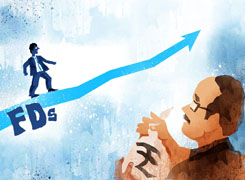Ramalingam Kalirajan |10876 Answers |Ask -Follow
Mutual Funds, Financial Planning Expert - Answered on Apr 23, 2024
He has an MBA in finance from the University of Madras and is a certified financial planner.
He is the director and chief financial planner at Holistic Investment, a Chennai-based firm that offers financial planning and wealth management advice.... more

Hello sir, I am about to retire in few years, employed in IT. I do not have much savings but have started to save in fixed deposits. I have chosen FD because it will not block my money for few years, and will be immediately avaialble in emergencies. What are the other similar savings options. My goal is to get some monthly interest from my savings, after retirement. Thanks
Senior Citizen Savings Scheme (SCSS): This is a government-backed scheme designed for individuals above 60. It offers attractive interest rates and can be a good source of regular income.
Post Office Monthly Income Scheme (POMIS): This is another government scheme that offers fixed monthly income. The tenure is 5 years, and the interest rate is payable monthly.
Pradhan Mantri Vaya Vandana Yojana (PMVVY): This is a pension scheme for senior citizens, providing guaranteed monthly pension payouts. It's backed by the government and offers regular income with the added benefit of return of purchase price at the end of the tenure.
Corporate Deposits: Some reputed companies offer fixed deposits with higher interest rates than banks. However, they come with slightly higher risk than bank FDs.
Debt Mutual Funds: You can consider investing in debt mutual funds that primarily invest in fixed-income securities like government bonds, corporate bonds, etc. They can potentially offer better returns than FDs with similar liquidity.
Dividend-paying Stocks: While this involves a higher risk compared to FDs, investing in blue-chip companies that pay regular dividends can provide an additional source of income.
Remember, while considering these options, it's essential to assess your risk tolerance, investment horizon, and financial goals. It's advisable to diversify your investments across various asset classes to balance risk and returns. Consulting a financial advisor can help tailor an investment strategy that aligns with your needs and goals.
You may like to see similar questions and answers below
Omkeshwar Singh | Answer |Ask -Follow
Head, Rank MF - Answered on Apr 25, 2022
Ramalingam Kalirajan |10876 Answers |Ask -Follow
Mutual Funds, Financial Planning Expert - Answered on May 14, 2024
Ramalingam Kalirajan |10876 Answers |Ask -Follow
Mutual Funds, Financial Planning Expert - Answered on May 21, 2024
Ramalingam Kalirajan |10876 Answers |Ask -Follow
Mutual Funds, Financial Planning Expert - Answered on Jul 03, 2024
Nitin Narkhede | Answer |Ask -Follow
MF, PF Expert - Answered on Sep 09, 2024
Radheshyam Zanwar |6740 Answers |Ask -Follow
MHT-CET, IIT-JEE, NEET-UG Expert - Answered on Dec 09, 2025
Naveenn Kummar |234 Answers |Ask -Follow
Financial Planner, MF, Insurance Expert - Answered on Dec 09, 2025
Ramalingam Kalirajan |10876 Answers |Ask -Follow
Mutual Funds, Financial Planning Expert - Answered on Dec 09, 2025
Ramalingam Kalirajan |10876 Answers |Ask -Follow
Mutual Funds, Financial Planning Expert - Answered on Dec 09, 2025
Radheshyam Zanwar |6740 Answers |Ask -Follow
MHT-CET, IIT-JEE, NEET-UG Expert - Answered on Dec 09, 2025
Radheshyam Zanwar |6740 Answers |Ask -Follow
MHT-CET, IIT-JEE, NEET-UG Expert - Answered on Dec 09, 2025
Nayagam P P |10853 Answers |Ask -Follow
Career Counsellor - Answered on Dec 09, 2025
Mayank Chandel |2569 Answers |Ask -Follow
IIT-JEE, NEET-UG, SAT, CLAT, CA, CS Exam Expert - Answered on Dec 08, 2025
Mayank Chandel |2569 Answers |Ask -Follow
IIT-JEE, NEET-UG, SAT, CLAT, CA, CS Exam Expert - Answered on Dec 08, 2025

Mayank Chandel |2569 Answers |Ask -Follow
IIT-JEE, NEET-UG, SAT, CLAT, CA, CS Exam Expert - Answered on Dec 08, 2025
























